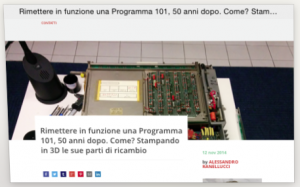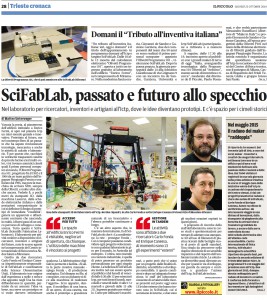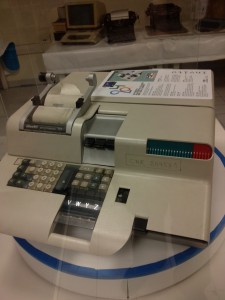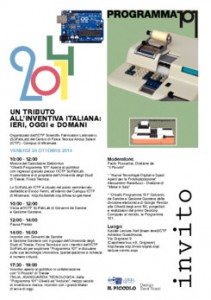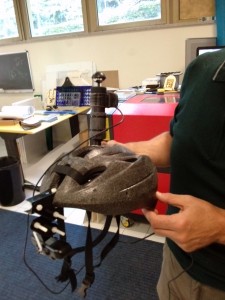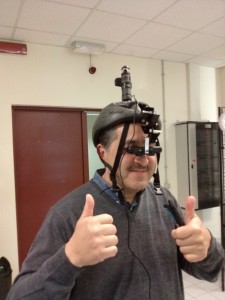L’ICTP ScifabLab e il recente esperimento di stampa 3D di una cinghia dentata per il restauro di una macchina “Programma 101” sono l’argomento dello splendido articolo di Alessandro Ranellucci apparso oggi sul sito web della Fondazione Make in Italy, l’importantissima realtà che rappresenta a livello nazionale il movimento dei maker e la rete dei FabLab italiani. Ringraziamo Alessandro per l’articolo e ne consigliamo a tutti la lettura!
Category Archives: ICTP SciFabLab
Nuova cinghia 3D-printed per una Olivetti Programma 101
Un esemplare di Olivetti Programma 101 datato 1969 di proprietà dell’Università di Trieste è stato riparato da Giovanni de Sandre e Gastone Garziera in visita presso lo SciFabLab ICTP. Una cinghia dentata di difficile reperibilità, necessaria per far funzionare la stampante, è stata ottenuta tramite stampa 3D a basso costo, in Nylon, usando OpenSCAD, Slic3r ed una Printrbot Simple Metal. A riguardo potete anche leggere il bell’articolo che Alessandro Ranellucci ha scritto per la webzine della Fondazione Made In Italy.
Low-cost 3D printing of mathematical objects from IMAGINARY.ORG
The ICTP SciFabLab has hosted recently a project related to the challenge of making low-cost replicas of some mathematical surfaces that are part of the educational effort of IMAGINARY.ORG. Now the results are presented at a conference in Cape Town (South Africa), here you can find the presentations:
“Low-cost 3D Printing: Maths you can touch”
(duration: 60 min, 68 slides)
IMAGINARY_1 (PDF, 26 MB)
IMAGINARY_1 (PPTX, 345 MB – WARNING: big file size!)
“Replicating the IMAGINARY collection of math objects using low-cost 3D printers”
(duration: 15 min, 18 slides)
IMAGINARY_2 (PDF, 5 MB)
IMAGINARY_2 (PPTX, 20 MB)
“Software tools and web resources to generate math objects for 3D-printing”
(duration: 30 min, 19 slides)
IMAGINARY_3 (PDF, 10 MB)
IMAGINARY_3 (PPTX, 25 MB)
Three related articles
extracted from the free open book on “Low-cost 3D Printing for Science, Education and Sustainable Development”, about OpenSCAD and K3DSurf (software tools to generate printable math objects)
- 3D Modeling with OpenSCAD – Part 1
by Sebastian Büttrich - 3D Modeling with OpenSCAD – Part 2
by Marius Kintel - From Math to Jewel: an Example
by Gaya Fior
excerpt_3DPrinting_Book (PDF, 11 MB)
First Desktop Computer at Work After 45 Years! / Olivetti Programma 101 Rimesso in Funzione!
Dopo 45 anni, abbiamo rimesso in funzione un desktop computer Olivetti Programma 101, stampando una cinghia ad-hoc con le nuove stampanti 3D a basso costo presso l’ICTP Scientific FabLab. Il tutto sotto la guida di Gastone Garziera durante la sua visita con Giovanni de Sandre, entrambi dal gruppo originale di progettisti e sviluppatori di Pier Giorgio Perotto dell’Olivetti di Ivrea.
Making a desktop computer Olivetti Programma 101 work after 45 years by using an ad-hoc soft belt printed with the new low-cost 3D printers of the ICTP Scientific FabLab in Trieste, Italy; under the guidance of Gastone Garziera, during his visit together with Giovanni de Sandre, from the famous Pier Giorgio Perotto’s Group at Olivetti, Ivrea.
Conferenza “I FabLab in FVG: dall’idea al progetto”
Sabato 25 ottobre in occasione del Linux Day 2014 organizzato dal Pordenone Linux User Group (PNLug) presso il Polo Tecnologico di Pordenone si è svolta la conferenza “I FabLab in Friuli Venezia Giulia: dall’idea al progetto”. Le slides sono disponibili per il download in formato PDF: I_FabLab_in_FVG
ICTP SciFabLab, passato e futuro allo specchio
Invito
This Friday, October 24, ICTP’s SciFabLab will celebrate the history, present, and future of Italian innovation with a special event open to the public
The programme will begin with an exhibit of “Olivetti Programma 101,” the world’s first desktop computer, at the SciFabLab in the Enrico Fermi building from 10:00 to noon. Giovanni de Sandre and Gastone Garziera, the two remaining members of the team of four Olivetti engineers who designed and built this revolutionary machine first produced in 1965, will be present.
UN TRIBUTO ALL’INVENTIVA ITALIANA: Ieri, Oggi e Domani
Incontro organizzato dall’ICTP Scientific Fabrication Laboratory (SciFabLab) – Invito per tutti – 24 Ottobre 2014
http://indico.ictp.it/event/7293/material/poster/0.pdf
ICTP a SciFabLab @ MakerFaire Rome!!!
During the period 3-5 October our SciFabLab will be present as exhibitor at the MakerFaire in Rome, therefore the normal activities and opening time will be suspended from 2 to 5 October. We will resume the normal schedule on Monday, Oct. 6th.
Nel periodo dal 3 al 5 ottobre il nostro SciFabLab sarà presente come espositore alla MakerFaire Rome, perciò le normali attività e l’apertura al pubblico saranno sospese dal 2 al 5 ottobre. Riprenderemo l’orario consueto con lunedì 6 ottobre.

